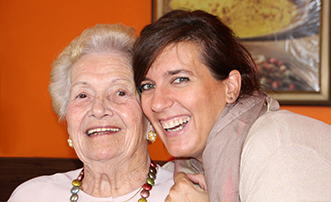This topic is one that comes up often. “Dementia” refers to a set of symptoms (thinking, memory, planning, etc.) that affect everyday function. “Alzheimer’s” is one specific type of dementia. Think of dementia as an umbrella term, with different types of dementia underneath, Alzheimer’s being the most common. Some causes of dementia-like symptoms are reversible – yes, you read that right! There are a lot of things that could cause someone to feel like they might have dementia that can be fixed or reversed. For example: thyroid issues, medication interactions or side effects, stress, vitamin deficiencies, lack of sleep, infections, and more.
Irreversible causes of dementia include diagnoses like those listed under the umbrella, such as Alzheimer’s or Lewy Body dementia. These are the most common types, but there are many different types of dementia.
You may be asking, “When should I start thinking about dementia?” The answer is now! There are steps you can take today to stay on top of your brain health for the future.
Get a Brain Check-Up
A Brain Check-Up is a free service offered by ADRC. The check-up is a set of three short activities that test how different parts of your brain are functioning. It only takes about 5-10 minutes to complete. This is not a diagnostic tool, but it is sensitive enough to alert you if there may be something you want to talk to your doctor about. Even if you are not concerned with your memory, this is a great opportunity to get a baseline. We recommend people over the age of 55 get a brain check-up every year. If something is detected early, you have time to plan for future care and make sure your wishes are known. Don’t wait until it’s too late!
Stay Educated
Our brain is an organ and as we age, it ages as well. Expect some changes but be aware of things that don’t feel quite right. Attend presentations or educational events that teach about early detection, warning signs, and steps to take to keep your brain healthy and active. ADRC offers many classes, presentations, and events around the topic of brain health and dementia. Check the magazine and online for opportunities!
Take Care of Yourself
Take hold of your physical and emotional health. These both can have an impact on our brain health, especially as we age. Stay physically active, eat more fruits and vegetables, start a new hobby, attend a virtual exercise class, and stay social. Diet, exercise, and socialization have been show to have positive impacts on brain health.
Source:
www.alz.org/alzheimers-dementia/what-is-dementia




